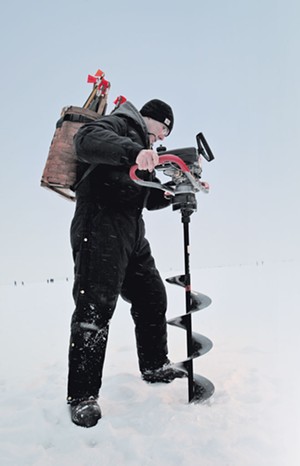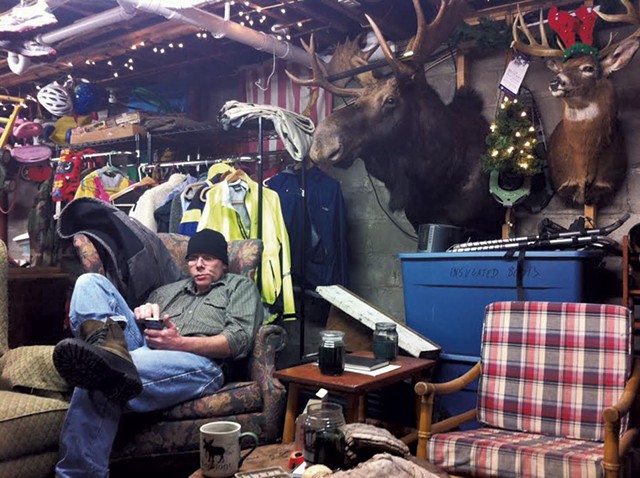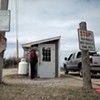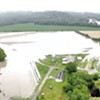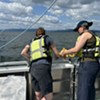Switch to the mobile version of this page.
Vermont's Independent Voice
- News
- Arts+Culture
- Home+Design
- Food
- Cannabis
- Music
- On Screen
- Events
- Jobs
- Obituaries
- Classifieds
- Personals
Browse News
Departments
Browse Arts + Culture
View All
local resources
Browse Food + Drink
View All
Browse Cannabis
View All
-
Business

Cannabis Company Could Lose License for Using…
-
Culture

'Cannasations' Podcaster Kris Brown Aims to 'Humanize'…
-
True 802

A Burlington Cannabis Shop Plans to Host…
-
Business

Judge Tosses Burlington Cannabiz Owner's Lawsuit
-
Health + Fitness

Vermont's Cannabis Nurse Hotline Answers Health Questions…
Browse Music
Browse On Screen
Browse Events
View All
Quick Links
Browse Classifieds
Browse Personals
-

If you're looking for "I Spys," dating or LTRs, this is your scene.
View Profiles
Special Reports
Pubs+More
Published February 18, 2015 at 10:00 a.m. | Updated October 8, 2020 at 4:56 p.m.
A year ago, Governor Peter Shumlin shocked Vermont — and the nation — by devoting his entire State of the State address to Vermont's opiate epidemic. This year, he picked another problem that has reached crisis proportions: the poor water quality in Lake Champlain. Despite significant investments, the governor conceded that Vermont's signature attraction is threatened by unchecked pollution. Thick blue-green algae blooms, sometimes containing toxic cyanobacteria, choke the most impaired bays and shorelines in warmer months.
As politicians will do, the governor included good news with the bad, rattling off a long list of water-quality champions: Friends of Northern Lake Champlain, the Lewis Creek Association, the Franklin Watershed Committee for Lake Carmi, business owners, farmers and the "Saint of Lake Champlain" — Sen. Patrick Leahy.
Notably missing from the list? James Ehlers of Lake Champlain International, a nonprofit devoted to promoting "swimmable, drinkable, fishable" water in Vermont's largest lake. Under Ehlers' leadership, LCI has grown from an annual fishing derby into a formidable mouthpiece for water-quality reform.
Ehlers is a different breed of environmental advocate, purporting to speak for Vermonters who live downstream from the Montpelier "suits." He commands a mailing list of some 24,000 anglers, sportsmen and other concerned citizens, and uses it to great effect. After a recent leak at the U.S. Coast Guard station in Burlington sent as much as 100 gallons of sewage into Burlington Bay a few days before the popular Penguin Plunge, Ehlers sent an email to his list with the eye-grabbing headline: "Burlington 'Penguins' Plunge ... Into Poop?"
To his admirers, Ehlers is a fearless crusader for water quality, willing to speak truth to power — even if that pisses off political officials and establishment environmental groups in the process.
To his detractors, Ehlers is, at best, a bombastic ideologue. Some doubt his motivations, wondering privately if he's fueled more by ego than environmentalism. Several clean-water advocates refused to speak on the record about Ehlers and his work, fearing retribution from Ehlers or his supporters for publicly criticizing his approach.
For plenty of his peers in the political world, though, Ehlers is all of the above: a tireless advocate and a showman; a master of press and politics, who is alternately Machiavellian and tone deaf.
"The water-quality crisis in Lake Champlain is beyond the cure of hollow political speech," said Patrick Berry, the former commissioner of the Department of Fish & Wildlife, "and James has the courage to say the things that need to be said — even if they're hard to hear because of the way he might say them."
Deadline Advocate
Divisive as he can be, Ehlers is in a sweet spot. The cause he's championed so stridently is seemingly, at long last, front and center in Montpelier. Politicians know they have no choice but to buckle down on water-quality measures; a 2008 lawsuit from the Conservation Law Foundation goaded the Environmental Protection Agency into reexamining Vermont's plan for Lake Champlain. Now the feds are holding the state's feet to the fire.
The EPA says Vermont needs to cut phosphorus pollution, which fuels blue-green algal growth in warmer months, by 36 percent — and way more than that in some portions of the lake. The agency said last fall that Vermont's plan to curb that pollution, crafted over months, didn't go far enough.
The EPA aside, higher-ups in state government have to answer for the fact that the lake isn't any better off despite years of spending and political rhetoric. Last summer on Lake Carmi, the small and relatively shallow lake not far from Missisquoi Bay, residents watched helplessly as thick, green sludge persisted on the lake into October. In Franklin County, St. Albans selectboard member Bruce Cheeseman told the St. Albans Messenger, "This is a drum that can't stop beating." One resident with a camp on St. Albans Bay wrote to the newspaper saying the algal blooms were at "crisis level, and should be treated as such. Not unlike a hurricane, we need emergency management."
The fact of the matter is that after all the meetings, draft proposals and number crunching, Vermont doesn't have a strategy to clean up the most impaired sections of the lake. The EPA estimates Vermont needs to cut phosphorous pollution into the Missisquoi Bay by 75 percent in order to restore the bay's health. When a staff scientist from the Department of Environmental Conservation spoke to a local conservation group in 2013, he concluded his talk with a cartoon showing two mathematicians in front of a blackboard. Scrawled midway through a complex equation was the phrase, "Then a miracle occurs." The cartoon was captioned, "I think you should be more explicit here in step two."
It's a point that Ehlers has been harping on for months. When other environmental advocates lined up at a Statehouse press conference to throw their weight behind Shumlin's plan, as unveiled in his address, Ehlers wasn't present; he believes he purposefully wasn't invited. Instead, he turned to the press, where in an op-ed in the Barre-Montpelier Times Argus he chided the chief executive for choosing politics over science.
"We need and want his plan to succeed," wrote Ehlers of Shumlin's latest raft of proposals. "But, sadly, it won't."
Working the Angles
Ehlers had to leave Colchester early last Thursday morning to make it to the Statehouse in time to testify. "There's a lot of political intrigue right now of me being boxed out of the debate," he said while barreling down Interstate 89 in his blue Jeep, which he describes as a "piece of shit." File folders jammed with paper shared the backseat with ice-fishing equipment.
"I didn't get into this to be politically popular," he said, squinting in the glaring sunshine of a cold February morning. "I do what I do to make a difference, not to make friends."
Once in Montpelier, he maneuvered the Jeep into a prime parking spot reserved for Associated Industries of Vermont — Ehlers serves on the pro-growth group's forestry committee and calls them "friends." He gathered up his files — and nicked his barn jacket on the razor-sharp edge of an ice-fishing auger — and clomped his way into the Statehouse. Even in Vermont's casual capitol, he stuck out like a sore thumb in faded Carhartt jeans, a flannel shirt and Sorels.
He headed up a narrow flight of stairs to the House Committee on Fish, Wildlife and Water Resources, where for the next hour and a half he'd weigh in on H.35, one of two major water-quality bills under consideration this session.
In its current form, the bill is sprawling. Large sections focus on agriculture: defining the ways farmers should behave to curb phosphorus runoff, and, for the time being, threatening expulsion from the tax break commonly known as "current use," which taxes farmland on its agricultural value rather than as developed land. Other sections drill down into stormwater permits, basin planning and timber harvesting.
The bill also proposes the creation of the Clean Water Fund — though no one knows how it would be funded since committee members struck Shumlin's recommendation for an additional fee on fertilizers.
Ehlers spent much of the hearing going page by page through the bill, recommending tweaks to the language and various line items. He also had plenty of big-picture suggestions: Require the use of so-called "best management practices" on farms statewide. Mandate stormwater retrofits on existing commercial properties of a half-acre or more. Don't just limit the spreading of liquid manure on farm fields; ban it outright.
As his testimony went on, you could see why Ehlers is viewed as a political outsider. Like a dyed-in-the-wool hippie, he extolled the virtues of composting toilets. He spoke about the possibility of capturing and converting phosphorus into energy with a series of community digester systems. He envisioned floating, man-made islands on Lake Champlain's impaired bays that could convert phosphorus in the water into plant matter.
Then, just as ardently, Ehlers veered into the territory of the libertarian, arguing in favor of public-private partnerships and against handing any more responsibility or resources over to the existing bureaucracies charged with enforcing water-quality standards: the agencies of agriculture and natural resources.
"Personally, I would like to adopt his ideas pretty much lock, stock and barrel," said committee vice chair James McCullough (D-Williston), although he conceded that some of them might be too far-reaching to be feasible.
click to enlarge 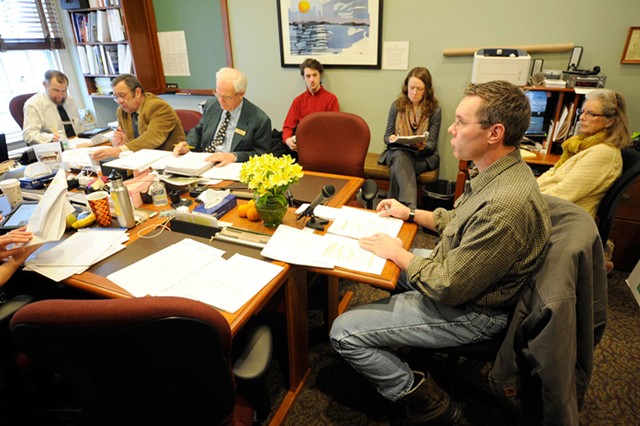

- Jeb Wallace-Brodeur
- James Ehlers testifies before the House Committee on Fish, Wildlife and Water Resources.
"I'm hearing it from left and right, Republican and Democrat," Ehlers told the committee members. "People are just fed up. This issue has been in the hands of an agency that denied there was a problem before a lawsuit ... There have been gross government failures.
"Missisquoi Bay is burning," he said. "St. Albans Bay is burning. Lake Carmi is burning."
It's a metaphor he's used repeatedly in recent weeks: The state of Vermont is facing the equivalent of a house fire, and quibbling over buckets of water instead of breaking out the fire hose.
'A Big, Big Personality'
While Ehlers' testimony ran long, members of the Vermont Citizens Advisory Committee on Lake Champlain's Future, on which Ehlers sits, were clocking some face time with Shumlin in the governor's ceremonial office.
Ehlers dashed in at the last moment, egregiously late. After just a few minutes, Shumlin and his aides came sweeping out of the office and down the nearby staircase, looking as if they were in a hurry.
Back out in the hall, Ehlers sidled up to a colleague, his blue eyes popping with their usual intensity. Sotto voce, he explained what went on in there — how the governor sought him out for a handshake and positioned himself next to Ehlers for the group photo.
That's when the governor reportedly whispered in his ear: "We need to get you back on the reservation."
Ehlers looked almost proud of the thinly veiled scold, which acknowledged both his importance and his rogue status.
What makes Ehlers so controversial?
For starters, his kind of big-picture thinking — which is "bigger than big picture," according to Kim Greenwood, the water program director and staff scientist at Vermont Natural Resources Council — doesn't jibe particularly well with the political landscape in which legislators and water-quality advocates analyze the minutia of "accepted agricultural practices" and buffer zones.
"I tend to work very deeply on specifics," said Greenwood, an engineer by training. Ehlers' approach, she said, doesn't necessarily align with "where we're all trying to get to. I've said to him, 'You've got some great ideas, but let's hear you get specific.' It's not his nature."
And then there's his demeanor.
"He's a big, big personality," said Anthony Iarrapino, formerly a senior staff attorney with CLF, one of a small number of organizations Ehlers said he admires for its work on environmental issues. "It's hard to be a big personality in a small state and not have detractors over time."
"James is all about shock and awe on behalf of the environment," acknowledged Bob Fischer, amiably. Fischer serves alongside Ehlers on the CAC, and is the chief operator at Montpelier's wastewater treatment facility. Ehlers' almost obsessive focus on sewage and wastewater overflows irks some plant operators, Fischer said, but most know that he's not pointing the finger at technicians; he's talking about a bigger problem of funding, accountability and infrastructure.
That said, "We don't always agree on his methods," said Fischer.
But Iarrapino, and Ehlers' other admirers, believe that Ehlers' approach fills a void within the advocacy world. The clean-water community, Iarrapino said, has never lacked for centrists; it's the agitators on the flank who can, at their best, pull those centrists toward more ambitious reform.
"The skunk-at-the-tea-party niche is not the best way to get invited to a lot of the fun tea parties," said Iarrapino, "but if that's the role you have to play, that's the role you have to play. I've respected James for doing that, when he might have had a politically easier time if he were less ardent and vocal and public."
It's a role that could assist mainstream environmentalists — if they're willing to learn how to wrangle a skunk.
"The advocacy community has often struggled with recognizing the strategic value of each other's respective roles," said Berry, who now works at the Vermont Community Foundation. "If you consider your position to be more 'moderate' than James and LCI, then you should use his work as a tremendous value in pulling the conversation in your direction."
From Long Island to LCI
The oldest of three boys, Ehlers grew up on Long Island when it was still somewhat rural. His maternal grandmother took over much of the child rearing after his parents separated, and Ehlers and his brothers spent many summers at her cabin in rural Big Indian, N.Y., hunting and fishing and bushwhacking in the woods. The boys would collect pillowcases full of snakes and hunt bats by night.
"All of these things are highly illegal, right?" he recalled with a chuckle.
As a teenager, Ehlers spent summers at a U.S. Coast Guard station on the Maine coast. That led to a naval scholarship to attend Villanova University. The first in his family to attend college, Ehlers had to scrap his first choice of majors — physics — because the Navy wouldn't pay for a five-year course of studies. Instead, he studied political science and, upon graduating, went into active duty.
"I was going into the service because I thought it was a great way to make a difference," he said. Instead, he had what he described as an "unglamorous experience." Disillusioned, he left the service at 25 and headed north — first to Pennsylvania, then to Vermont.
A series of odd jobs followed. Ehlers worked as a logger until an accident badly injured a friend. He tried his hand at organic vegetable farming, and failed. "It's impossible to make money growing vegetables in this state unless you have a trust fund," he declared. He taught for a while in a middle-school science classroom.
Determined to have his own business, he started a guiding service using a nickname he'd earned on the ski slopes: Uncle Jammers. In 1997, Ehlers earned the guide of the year award from the Vermont Outdoor Guide Association. The plaque still hangs in the man cave in his unfinished basement — a spot he calls the "Rabbit Hole." Meanwhile, he had started contributing stories to Vermont Outdoors magazine, and found he had a knack for writing.
He took over as editor at the publication in 1998.
It was around this time that Ehlers started working with Lake Champlain International, doing some contract and volunteer work. The nonprofit got its start in the '80s advocating for cold-water fisheries in Lake Champlain, but by the time Ehlers got involved, LCI was almost entirely focused on its popular Father's Day fishing derby. "The derby became so successful that it eclipsed everything else," said Ehlers.
But in late 1998, two years after Ehlers started volunteering with the group, behind-the-scenes drama prompted the longtime organizers to walk away. In early 1999, the former organizers handed over the group's mailing list and trade name, and Ehlers and a few supporters set up a new nonprofit. He scrambled that spring to pull off the annual fishing derby. The plan was to spend a few years building the organization back up, then hand it off to the next director.
But in the years since, Ehlers' work at LCI has grown from a volunteer, temporary gig into an all-consuming job that generated $636,832 in revenue and paid him $83,569 in 2012, the most recent year for which tax documents for LCI are available. Under his leadership, the organization has branched out well beyond the derby — which has grown fourfold to attract 6,000 anglers a year — to advocate for dam removals and stream restoration, sponsor fishing mentorship programs for at-risk kids, and provide grants to after-school programs to introduce more kids to fishing. Picking up on Vermont's locavore movement, Ehlers single-handedly jump-started a conversation about Lake Champlain as a source of food; now he's working with the Vermont Fresh Network to get more chefs excited about cooking fish from the lake.
Another idea — for a "watershed-friendly" certification program for properties akin to LEED certification for efficiency, or Energy Star for appliances — spun off into a separate for-profit company.
Ehlers has made a name for himself calling out wastewater and sewage overflows, which he does religiously through the LCI e-newsletter. And he's become the go-to guy for Vermonters who might otherwise be wary of reporting water-quality violations themselves. He relays complaints directly to the Agency of Agriculture Food & Markets, which is charged with enforcing water-quality rules on farms. He'll clue the agency in on any number of potentially problematic situations: among them, cows in streams, manure piled near water or farmers spreading manure irresponsibly.
Laura DiPietro, the deputy director of agricultural resource management at the agency of ag, doesn't mind the intervention: "He's always been straight to the point, which, frankly, I appreciate."
For many years, Ehlers worked the equivalent of two full-time jobs: running LCI and editing Vermont Outdoors. He stepped away from the editorship in 2005 — but not before he used his considerable influence at Vermont Outdoors to rile up some of the same environmentalists with whom he hobnobs today. The issue was the Champion Lands deal, in which the state acquired a broad swath of northern forestland from a former paper company.
Ehlers led the charge among sportsmen who were unhappy with the terms of the deal. Press accounts from the era quote Ehlers as railing against "egocentric Chittenden County elitists" and environmental groups he dismissed as "emotional bobos."
"Ehlers was a huge pain in the ass," said Kevin Ellis, who lobbied at the time for a coalition of conservation groups. In the years since, Ellis noted, "It seems he's changed his spots."
The battle was an ugly one, and Ehlers, by most accounts, was vicious and unyielding. But to his credit, many of his staunchest opponents from that era — including Steve Wright, a former Fish & Wildlife commissioner and the New England regional organizer for the National Wildlife Federation during the Champion Lands debate — say he's mellowed in recent years, and now speak admiringly of his work.
"My experience with James was that he was fearless," said Wright. Now, he said, "I am pleased, as a water advocate, that James has ended up where he ended up."
Down the 'Rabbit Hole'
A day after his appearance in Montpelier, wearing the same flannel and jeans, Ehlers was sitting comfortably among mounted heads of moose and deer in his Rabbit Hole. Stacked around him was enough fishing and hunting gear to stock an outdoor store.
Piled up, too, were the leftover lawn signs from elections past — more proof of Ehlers' stubborn refusal against easy categorization. He's stumped for traditional Republicans and ponytailed Progressives, for wild-haired Sen. Bernie Sanders and good ol' boy Lt. Gov. Phil Scott. Ask him to define his politics, and he answers, "Catholic."
So Catholic, in fact, that Ehlers proposed to his second wife, Elizabeth, in the middle of mass, slipping a ring onto her finger as he took her hand during the traditional sign of the peace. He thought it was a fitting way to honor the role faith played in their relationship. The priest wasn't amused; what to Ehlers had been an earnest gesture — one he and Elizabeth remember fondly each week at mass — seemed irreverent and disrespectful to the monsignor.
The penchant for irreverence carries over into social media, where Ehlers is a prolific poster of Facebook updates and commentaries. On his personal page, he rotates among political discussion, off-color comedy and inspirational quotes PhotoShopped over images — like the one he posted on February 3, of Martin Luther King Jr., bearing the inscription, "A genuine leader is not a searcher for consensus but a molder of consensus." Ehlers' commentary read, "Let's get it done, folks!"
His wife tagged him on an image that read, "I'm not an asshole. I'm actually one of the nicest people you will ever meet. You are just pissed because I can see through your bullshit."
Ehlers responded, "Thank you for the encouragement, Elizabeth!"
"I feel like there's this perception about me that I enjoy not being agreeable," said Ehlers. He insisted it's not true, and talks about his work as "building bridges." Two years ago LCI introduced the Blue Resolution Coalition; today, the coalition has 46 signatories, ranging from private businesses to faith organizations and mainstream environmental groups.
Ehlers considers his advocacy a "moral obligation." Left to his own devices, he'd rather retreat to his camp in Ferdinand to hunt moose and teach his kids to fish. His two oldest children — 6-year-old Lillian and 4-year-old Edward — proved good shots in this year's Yankee Sportsman's Classic. The couple also has a young toddler and a fourth child is due in July.
Sitting in a shabby, old armchair, Ehlers scrolled wistfully through Facebook photos from a fall hunting expedition. He queued up a video, in which he — clad in camo and wearing a thick beard streaked with gray hairs — bellowed out into the northern woods, enticing a moose toward a small band of merry huntsmen.
It takes patience to bag a wild animal. It'll take a lot more than that to clean up Lake Champlain.
Ehlers is holding off on passing judgment on the proposed legislation, though he's still stumping for a more ambitious solution than the ones being bandied about in Montpelier. He'll keep touting phosphorus capture and conversion and talking up his floating islands. And he understands the game: If you want regulations on acre-sized parcels, ask for half-acres. If you want to tax Vermonters $1 a week for a clean water fund, ask for $2.
"They're building algae- powered buildings in Germany," said Ehlers. "You flush the toilet, and your urine and feces keep the lights on." If we could pledge to land on the moon in the 1960s, having no idea at the time how to get there, Ehlers would like to believe we can clean up our water.
But whether he has a seat at mission control may have more to do with the politics of Montpelier than the issue of water quality. Asked about the governor's remark to Ehlers — "We need to get you back on the reservation" — Shumlin spokesman Scott Coriell said he wasn't in the room and didn't hear it, but "such a comment wouldn't surprise me."
"While there are different views on how to achieve the shared goal of cleaning up Lake Champlain, there is a broad coalition working together in an unprecedented way to secure the plan and funding to make a real start on the effort," wrote Coriell in an email. "James is a true believer in the work to clean up Lake Champlain, but he needs to decide whether he wants to be part of the progress, even if he doesn't agree with every part of the proposal."
If he's being cut out of meetings, as he suspects, for his contrarian views, Ehlers takes that as a compliment.
"Thank you for acknowledging that I'm not willing to go along to get along," said Ehlers. In his mind, at least, the lake deserves more.
The original print version of this article was headlined "Water Warrior"
Related Stories
Got something to say?
Send a letter to the editor
and we'll publish your feedback in print!
Tags: Environment, Environment, EPA, conservation, water quality, Lake Champlain, ice fishing, fishing, blue-green algae, phosphorus, algae blooms, watershed, Department of Fish and Wildlife
More By This Author
About The Author

Kathryn Flagg
Bio:
Kathryn Flagg was a Seven Days staff writer from 2012 through 2015. She completed a fellowship in environmental journalism at Middlebury College, and her work has also appeared in the Addison County Independent, Wyoming Public Radio and Orion Magazine.
Kathryn Flagg was a Seven Days staff writer from 2012 through 2015. She completed a fellowship in environmental journalism at Middlebury College, and her work has also appeared in the Addison County Independent, Wyoming Public Radio and Orion Magazine.
About the Artist

Matthew Thorsen
Bio:
Matthew Thorsen was a photographer for Seven Days 1995-2018. Read all about his life and work here.
Matthew Thorsen was a photographer for Seven Days 1995-2018. Read all about his life and work here.
Speaking of...
-

Flooding Hurts Water Quality in Lake Champlain
Jul 22, 2024 -

Youth Conservation Crews Head Out to Repair Damage From 2023 Floods
May 22, 2024 -

Totally Transfixed: A Rare Eclipse on a Bluebird Day Dazzled Crowds in Northern Vermont
Apr 10, 2024 -

Critics Call a Logging Plan in the Worcester Range a Missed Conservation Opportunity
Jan 24, 2024 -

Vorsteveld Farm Held in Contempt Over Runoff
Jan 10, 2024 - More »
Comments (11)
Showing 1-10 of 11
Comments are closed.
From 2014-2020, Seven Days allowed readers to comment on all stories posted on our website. While we've appreciated the suggestions and insights, right now Seven Days is prioritizing our core mission — producing high-quality, responsible local journalism — over moderating online debates between readers.
To criticize, correct or praise our reporting, please send us a letter to the editor or send us a tip. We’ll check it out and report the results.
Online comments may return when we have better tech tools for managing them. Thanks for reading.
- 1. A Farting Bear Caught on Camera Is What We All Needed to See True 802
- 2. Immigration Officials Illegally Deported Vermont Family, Advocates Say News
- 3. Rita Mannebach Traveled From Florida to Vermont to Choose How She Died Health Care
- 4. An Inmate’s Pleas About Her Dangerous Cellmate Were Dismissed. Then She Was Attacked. Crime
- 5. Some Residents Flooded Out of Plainfield Think Goddard’s Campus Should Become Home Economy
- 6. Vermont's Local News Publishers Are Endangered. Can They Be Saved? Media
- 7. Vermont Farmers Experience a Second Devastating Summer of Flooding Environment
- 1. A Farting Bear Caught on Camera Is What We All Needed to See True 802
- 2. Rita Mannebach Traveled From Florida to Vermont to Choose How She Died Health Care
- 3. Moving on From Its Industrial Past, St. Johnsbury Is Attracting Young Entrepreneurs and Building a Vibrant Downtown Economy
- 4. Heavy Rains Hit Vermont Again as Flooding Washes Out Roads News
- 5. Neighbors Band Together to Save Cattle From Hinesburg Floodwater Environment
- 6. Vermont Health Officials Prepare for Bird Flu as It Spreads in Dairy Herds News
- 7. Vermont's 'Orwellian' Butter Gets a Shout-Out in Hit Show 'The Bear' True 802


























